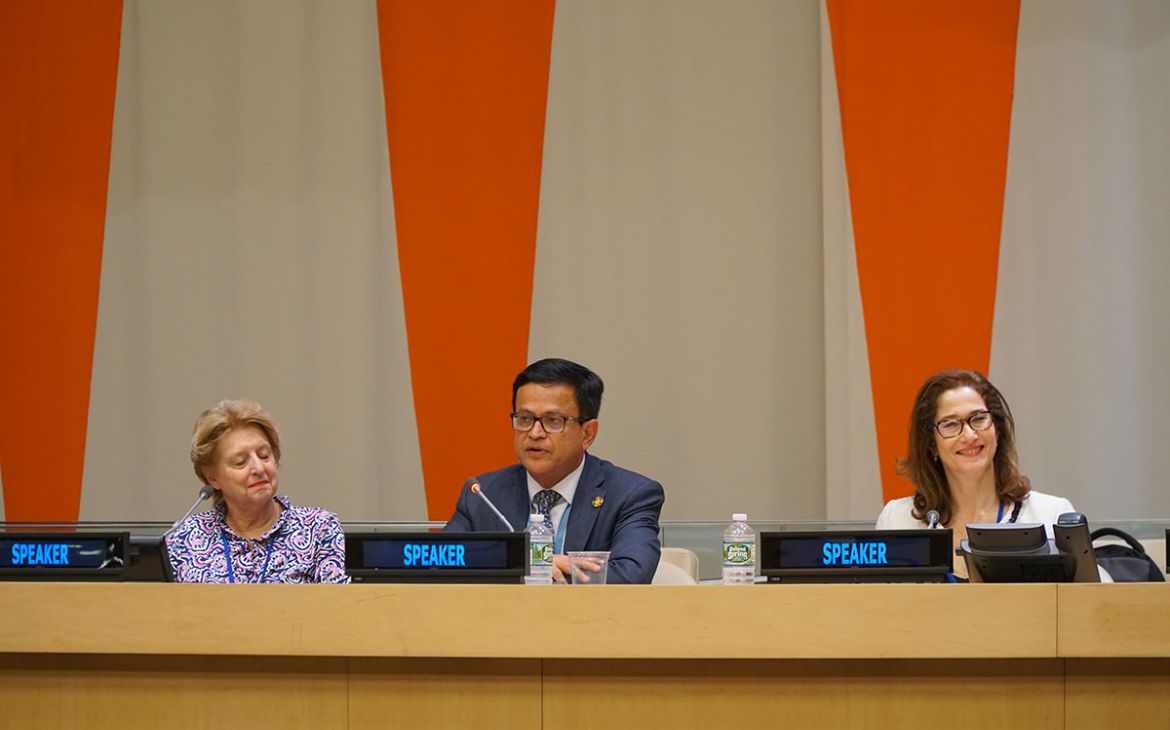11 July 2018 - The 2018 High-Level Political Forum has provided space for representatives of the Higher Education Institutes to share best practices, innovative approaches and discuss challenges as Universities embrace the 2030 Agenda and start mainstreaming the SDGs in their curricular, research activities and programmes. The last panel of the HESI Global Day was chaired by UNITAR Executive Director Nikhil Seth and included Secretary-General of the Association of the Commonwealth Universities, and representatives of the University of Geneva, Tecnologico de Monterrey, University of Pennsylvania, University of Papua New Guinea, and SDSN.
A number of Universities and Organizations have been spearheading innovative approaches to incorporating the SDGs in their teaching and research to support the achievement of the global goals through human competences and scientific solutions. These initiatives were discussed during the dedicated high-level panel representing the last segment of the Higher Education Sustainability Initiative Global Day organized on the sidelines of the HLPF2018 on 11 July.
When opening the panel, UNITAR Executive Director noted:
The SDGs have taught us some important lessons: need for interdisciplinary approaches, engagement and stronger sense of citizenry, importance of data for evidence-based decisions. They require a mind shift in the way we approach these respective areas of work… Will all the efforts made so far motivate greater commitment by students when they come to positions of power?
The invited panelists have shared what they have been doing differently in their Universities and networks to reflect the SDGs. Ms. Joanna Newman, Secretary-General of the Association of the Commonwealth Universities, the oldest network bringing together 500 Universities around the world, for example, noted that addressing inequalities and the sustainability of local capacities have gained in importance in their activities. She has also highlighted their efforts to strengthen contributions to the SDGs through better monitoring and reporting on their activities which will in turn require some novel thinking against the backdrop of Universities’ autonomy and organizational diversity.
Mr. Jean-Marc Triscone, Vice-Rector of the Geneva University, shared some of the pioneering work done through Tsinghua-Geneva Initiative, a partnership between Tsinghua and Geneva Universities on promoting SDG-aligned education. Some of the highlights include a joint Master degree, and a multi-disciplinary summer school using a challenge-based, project based approach and bringing students from around the world. The aspiration is to help replicate this programme in other corners of the world. The University of Geneva will also be launching the second edition of the Geneva Trialogue, a high-level debate between academia, UN and private sector, in the run-up to the World Economic Forum in January 2019.
UNITAR Executive Director invited panelists to also share their ideas on how these initiatives could be scaled up recognizing the University world - the sustainability leaders put aside – has not been moving as fast as it was needed. The dominance of the curiosity-driven research, although very important, was highlighted as one area where more needed to be done.
Other issues covered during the panel included the growing importance of technology, the key role of Universities in building sustainability skills from engineering to management capacities, the critical role of Universities in providing citizens, more stable and democratic societies. The representative of the Centre for Climate Change and Sustainable Development, University of the Papua New Guinea pointed out that they have been the forruners of sustainability and have played a critical role in helping their Government to develop national and promote international sustainability policies.
The panel was part of the Higher Education Sustainability Initiative Global Day organized by UNITAR, UNDESA, UN Global Compact, UNESCO and University partners driving key initiatives in the sustainability area.


